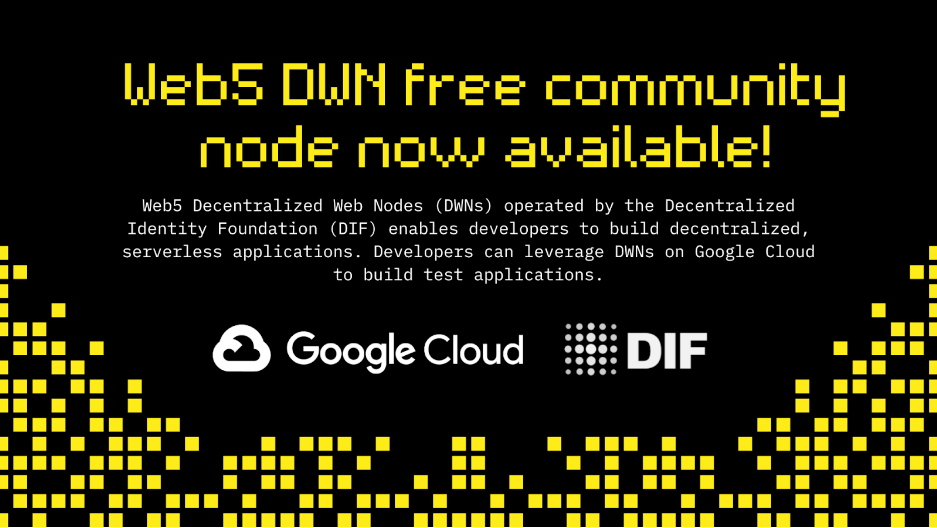The Decentralized Identity Foundation (DIF) today announced the availability of the Decentralized Web Node (DWN) Community Instance, operated by DIF and powered by Google Cloud.
Decentralized Web Nodes (DWNs - also referred to as DWeb Nodes) are personal data stores that eliminate the need for individuals to trust apps to responsibly use and protect their data. Instead, data is owned and controlled by the individual — offering developers a brand new way to create apps that request individuals’ permission to read and access their data, but don’t store it.
The Managed DWN service or “community node” will allow existing and new Google Cloud customers to more easily build test applications using DWNs. Rather than having to run their own DWN or server infrastructure to store data, developers will be able to leverage a DWN on Google Cloud to build test applications.
Developers can use the community DWN node at no cost, including up to 1GB of storage per DID.
The service was launched during a strongly attended DIF community call earlier today (event highlights below).
The launch marks an exciting milestone in DIF’s mission to make it easy for developers to build using decentralized identity, and follows the recent establishment of the Veramo User Group and an upgrade to DIF’s Universal Resolver infrastructure.
SC members Daniel Buchner and Markus Sabadello will share the stage with leaders from Google Cloud and DIF member org TBD at We Are Developers World Congress in Berlin tomorrow to shine a spotlight on the new service, including a live demo of applications built using DWNs.
Today’s launch event in brief
Following an introduction by DIF’s Executive Director, Kim Hamilton Duffy, and DIF Ambassador, Jeffrey Schwartz, Founder and CEO of Dentity, several companies who are deploying DWNs in real-world use cases gave case study presentations.
Daniel Bucher and Andor Kesselman, co-chairs of the DWN work item within DIF’s Secure Data Storage working group, described how DWeb Nodes work, and what developers can do with them.
A hot topic that surfaced during the discussion and subsequent Q&A, led by DIF’s Senior Director of Community Engagement, Limari Navarrete, was how developers can define protocols that give users fine-grained control over the data in their DWN.
Protocols “encode rules around how people interact with my data,” Andor said. “It’s very powerful!” he added.
Celina Villanueva from Extrimian described a pre-authorisation protocol designed to enable first responders at an emergency to access critical information in an accident victim’s DWN. The protocol powers a new service that will be piloted in Buenos Aires later this year. Extrimian also envisages the protocol enabling customers to pre-authorise their bank to access personal information when needed.
Michal Jarmolkowicz described how Swiss Safe is working with clients in the travel and healthcare sectors to build new services around DWNs, including a protocol enabling patients to take control of their health record and grant specific, time-limited access to healthcare professionals.
Another recurring topic was how DWNs and Verifiable Credentials can interact. Insights included how DWNs enable backup and recovery of VCs, and the benefits of combining VCs with a “bring your own data” model.
There was also discussion about the adoption status of DWNs, and how to accelerate this. Jeffrey Schwartz said Dentity clearly sees an adoption cycle underway, based on Proofs of Concept they are involved in or aware of. Michal Jarmolkowicz noted that searching out CIOs and CTOs with an active “technology radar” (a service that flags and tracks emerging technologies) has proved fruitful for Swiss Safe, as they are more likely to be aware of Decentralized Identity and the value it offers. He added that Data Protection Officers often respond enthusiastically to DWNs.
Several participants wanted to know which cloud platforms and developer tools DWNs can be used with today. Daniel Buchner said Google has already adapted DWNs for Cloud SQL and Blobstore, while others are currently working on adapters for AWS S3 and other services. He also shared the insight that cloud providers are incentivized to enable developers to add more DWN protocols, since this drives more utility from customers’ data, encouraging them to increase their service usage.
Wrapping up, he urged participants to “get involved and see what you can build. Together, DIF’s Community Node and the Web5 SDK make it pretty simple. Try writing your own protocols and have fun with it!”
What are Decentralized Web Nodes?
DWNs are personal data stores and peer-to-peer communication nodes that serve as the foundation for decentralized apps and protocols. They live on devices and can be replicated on hosted instances in the cloud. These data stores are a realization of true serverless applications in which developers can store app data without using centralized servers or an account with a centralized service.
DWNs are a foundational component of Web5, an open source platform that provides a new, reliable identity and trust layer for the Web to enable decentralized applications and protocols that solve real problems for people. Built on open standards developed by the World Wide Web Consortium (W3C) and DIF, Web5 consists of three key pillars: Decentralized Identifiers (DIDs), Verifiable Credentials (VCs), and Decentralized Web Nodes.
Why use DIF’s Managed DWN Service?
The service empowers developers to build decentralized apps that give users full ownership and control over their data, without needing to ask each user to deploy a local DWN. With DIF’s Managed DWN Service, developers can build decentralized apps with data in DWNs hosted on Google Cloud, making it easier than ever before to empower individuals with ownership and control of their data.
How do I get started with Managed DWNs?
To start building decentralized apps on Web5, developers can visit developers.tbd.website.
To access the DIF community node, start here.
